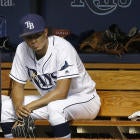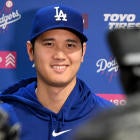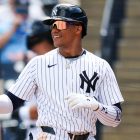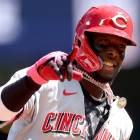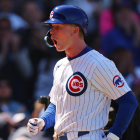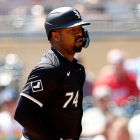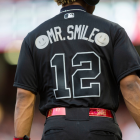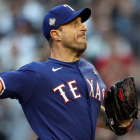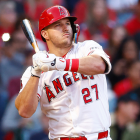Believe it or not, the offseason is here. Free agency begins Tuesday and we've already seen the hot stove kindled by a few trades. With due respect to Cameron Maybin and Pat Neshek -- both useful players who ought to help their new teams -- neither will be the biggest name involved in trade talks this winter.
Pinning down every player likely to surface in trade discussions would be impossible. So, instead of attempting that, we will focus on a group of players who 1) Are almost certain to be talked about and 2) Are snared in a web of interesting circumstances. We're not saying these players will be traded -- though some listed here will be. We're just saying that these players' names will arise in rumors.

Presuming the Rays will operate like normal this winter -- meaning everyone is available for the right price -- then Chris Archer is the most intriguing pick of the bunch. He is, after all, a front-line starter with the brains and athleticism to maintain that status for years to come. Those are hard to come by.
The questions for the Rays are whether they should move Archer -- due to his down year (from a surface-level perspective) and their own competitive aspirations -- and whether they could get fair value in return. Remember, Archer is owed less than $20 million over the next three seasons; his contract then includes a pair of club options, valued at $20 million total. Any acquiring team would be gaining Archer's remaining prime for less than $40 million. That's a sweet deal, one necessitating a hefty prospect payout.
For those reasons, Archer is likely to remain in St. Petersburg. At least for another season or two.
Yes, Kyle Schwarber just completed a miracle comeback to rejoin the Cubs in the World Series. And yes, Cubs officials and players seem to love him. Those facts don't negate his odd fit on the roster.
There's no doubting Schwarber's ability to hit -- but where does he play?
The Cubs have a long-term solution at first base in Anthony Rizzo and might not want Schwarber behind the plate due to his knee injury. That leaves left field as the lone option. That's a problem too given the Cubs have Ben Zobrist and Jorge Soler hanging around. Maybe the solution is shifting Jason Heyward to center field on a permanent basis or using Javier Baez in a super-sub role. But the most practical solution -- or the one we'll all keep expecting to happen at some point -- is trading Schwarber to a team where he can slot in at first base or designated hitter.
The Cubs have no reason to give Schwarber away, so if they do move him, expect it to be for a big-league player who can help their repeat chances in another capacity.
Vincent Velasquez was acquired last winter in the Ken Giles trade, and was a revelation for the Phillies ... until the second half, when things fell apart. (He allowed 12 home runs in 52 innings after allowing nine in his first 78.) Because his name surfaced in deadline trade talks, you can bet he'll be revisited this winter.
The argument for keeping Velasquez is straightforward. He's young, he's promising and he's cheap. The Phillies are getting closer to completing their rebuild and he could be an important part of that process. Still, the argument for trading Velasquez is that pitchers break all the time. Heck, Velasquez might have already peaked for all we know. As such, if the Phillies can get a king's ransom in return, they would be wise to consider it. Anything less than an absurd package, however, could give off the appearance that they're spinning their wheels rather than proceeding with intent to compete in the near future.
Best guess: Velasquez will open the season in the Phillies rotation.

Remember when Wade Davis was held as baseball's best reliever? An injury-ravaged 2016 probably cost him that title (perhaps to another guy on this list) and came at the worst possible time for the Royals.
Davis is entering the final year of his contract, which will pay him $10 million. The Royals showed last deadline that they're willing to keep this group together as best as possible, but Dayton Moore has to be realistic. Kansas City almost certainly cannot afford to keep Davis beyond this season, and the newly introduced injury dynamic means a winter trade could be the safest play.
This isn't intended to sound negative about Davis, by the way. If he's healthy, he just might still be the best reliever in baseball. There's just too much incentive on the Royals' part to find a workable trade to believe he'll be back for a fifth season in K.C.
Relative to the situations listed here, this one is straightforward. Brian McCann has three guaranteed seasons left on his contract, but has seen his production slip since signing with New York. At the same time, the Yankees have a younger, cheaper, seemingly better catching option in Gary Sanchez.
McCann should draw interest because while he isn't what he once was, he's a capable hitter and receiver whose $17 million salary no longer seems absurd. Finding an above-average, two-way catcher is never easy. As a result, expect quite a few teams -- including McCann's former organization in Atlanta -- to check in on his availability.
Furthermore, expect McCann to be someone else's Opening Day starter come April.
Finally, we reach Andrew Miller, perhaps the breakout star of the postseason. Miller has two years remaining on his contact (both valued at $9 million) which would seem to make him an odd fit here.
But consider that the Indians rode Miller hard after acquiring him at the deadline; that they would have to invest close to $20 million in Miller and Cody Allen (a significant amount for a team that entered this season with a $96 million payroll); and that, for all his ability to shut down opposing lineups and resemblance to a daddy long legs, he's still a relief pitcher whose 74 innings were a regular-season high since he moved to the bullpen.
The Indians, like the Rays and Pirates and other small-market teams, have to keep an eye on the future in addition to one on the present. Trading Miller would undoubtedly hurt them, but they have to consider everything.

























